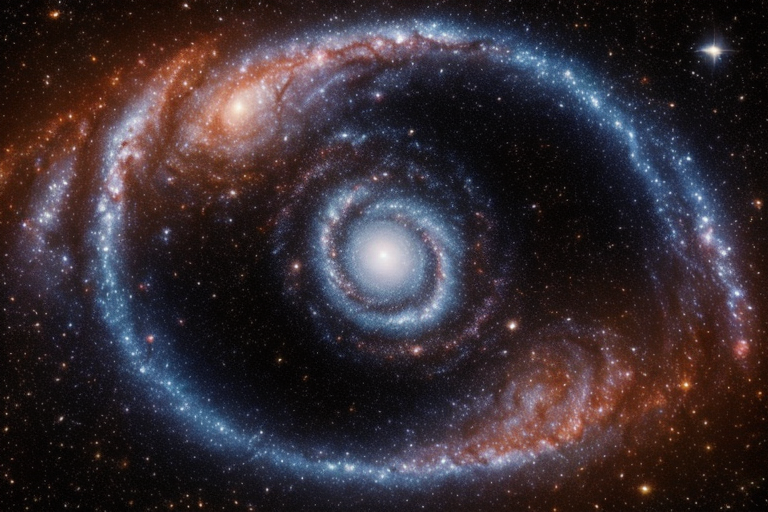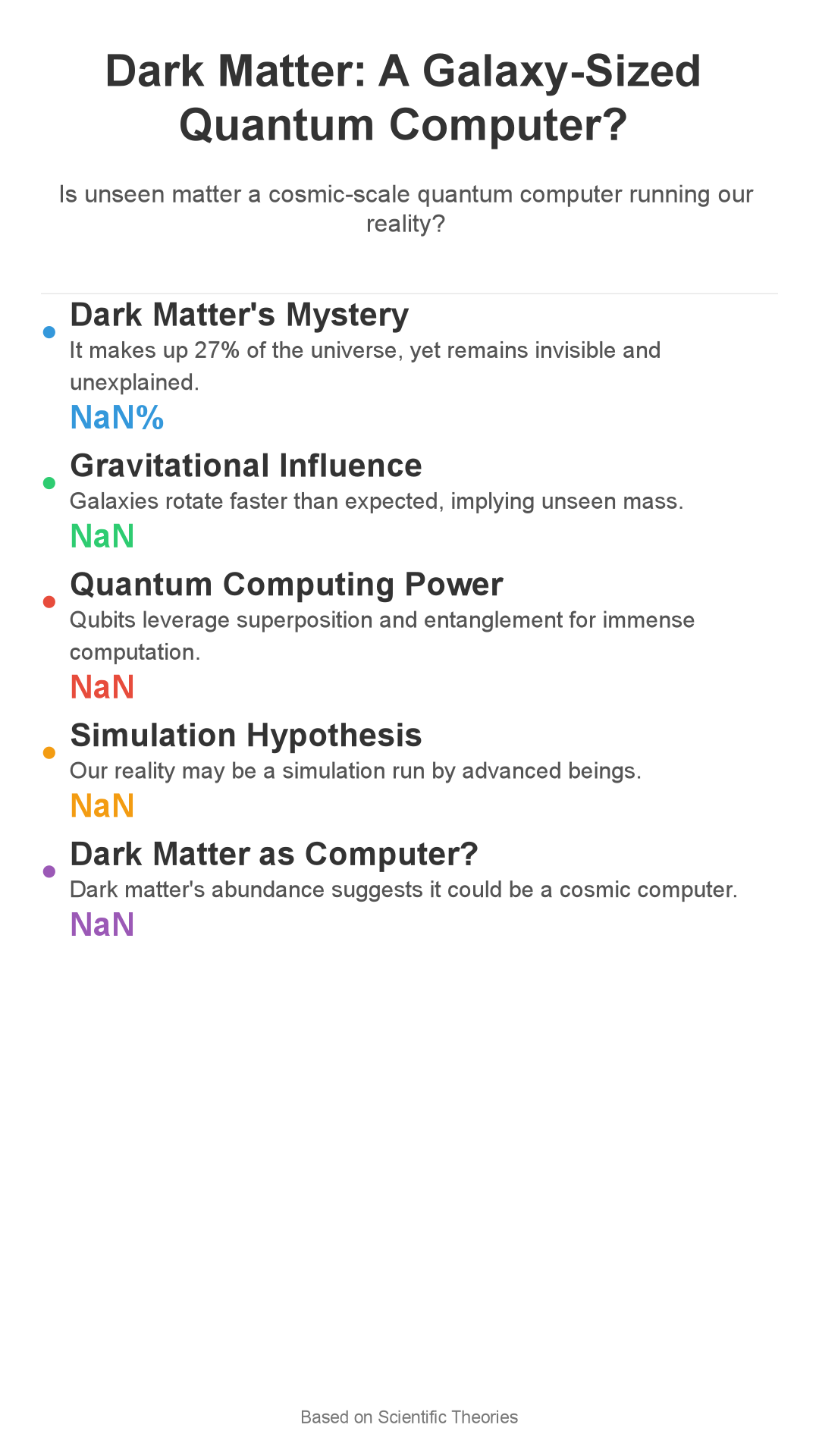
Could dark matter be more than just unseen mass? What if it's a vast, galaxy-spanning quantum comput
Ever feel like something’s not quite “real”? What if the enigmatic dark matter, that unseen force shaping galaxies, isn’t just a collection of particles, but a colossal, galaxy-sized quantum computer orchestrating our entire reality? Ready to question everything? Smash that like button and follow for more fascinating cosmic possibilities!
Is Dark Matter a Giant, Galaxy-Sized Quantum Computer, and Are We the Program?
The universe is full of surprises. We only directly observe and understand a mere 5% of its composition. The remaining 95%? Dark matter and dark energy.
While dark energy is believed to drive the accelerating expansion of the universe, dark matter, constituting roughly 27% of the cosmos, remains stubbornly invisible and mysterious.
But what if this unseen substance is far more than just undiscovered particles? What if it’s something altogether more… extraordinary?
The Nature of Dark Matter and its Mysteries
Dark matter’s presence is inferred through its gravitational influence. Though invisible to our instruments, we know it’s there because galaxies rotate at speeds that defy explanation based on visible matter alone.
Without the additional gravitational pull of dark matter, they would simply fly apart.
- Rotation Curves: Stars at the outer edges of galaxies orbit at surprisingly high speeds, indicating a greater mass than we can observe.
- Gravitational Lensing: Light bends as it passes massive objects, and the degree of bending suggests the presence of unseen mass concentrations.

Illustration of gravitational lensing around a galaxy cluster, showing how light from background galaxies is distorted. - Galaxy Clusters: Galaxies within clusters move faster than expected, requiring the extra gravitational force exerted by dark matter to maintain the cluster’s integrity.
Despite this compelling evidence, the precise nature of dark matter remains elusive. Leading theoretical candidates include:
- WIMPs (Weakly Interacting Massive Particles): Hypothetical particles that interact only weakly with ordinary matter, making them incredibly difficult to detect.
- Axions: Extremely lightweight particles predicted by extensions to the Standard Model of particle physics.
- Sterile Neutrinos: Heavier counterparts to the familiar neutrinos, but with even weaker interactions.
However, these models aren’t without their challenges. We haven’t yet directly detected any of these particles, despite extensive experimental efforts.
Moreover, some cosmological simulations based on these models struggle to accurately reproduce certain observed phenomena, such as the “cusp-core problem” (the discrepancy between the predicted high density of dark matter at galactic centers and the observed lower density) and the “missing satellites problem” (the unexpected scarcity of small dwarf galaxies orbiting larger galaxies).
Quantum Computing and the Universe as Simulation
Now, let’s shift our focus to the forefront of computation: quantum computing. Unlike classical computers that store information as bits representing either 0 or 1, quantum computers use “qubits.
” Qubits leverage the principles of quantum mechanics to exist in a superposition, meaning they can represent both 0 and 1 *simultaneously*.
They can also be entangled, meaning two qubits become linked, sharing the same fate regardless of the distance separating them.
This enables quantum computers to perform calculations that are fundamentally impossible for even the most powerful conventional computers.
- Superposition: The ability of a qubit to exist in multiple states concurrently.
- Entanglement: A strong correlation between two or more qubits, irrespective of their separation.
This immense computational potential fuels consideration of the “simulation hypothesis,” the notion that our reality is a simulated environment, possibly created by a technologically advanced civilization. Arguments supporting this hypothesis include:
- Technological Progress: The rapid advancement of technology suggests that simulating reality is becoming increasingly feasible.
- Computational Limits: If a civilization develops the capability to simulate universes, they would likely create many, leading to a vast number of simulated universes compared to a single “base reality.”
- Quantum Weirdness: The peculiar behavior of quantum mechanics could be an artifact of the simulation’s underlying code, reflecting the limitations or specific rules of the simulated environment.
Of course, counterarguments exist, such as the immense computational resources required and the current absence of definitive proof.
However, if a civilization *could* simulate a universe, it would likely require staggering computational power, perhaps only attainable through… a quantum computer.
The Dark Matter Quantum Computer Hypothesis: Arguments and Challenges
This is where things take a truly speculative turn. The dark matter quantum computer hypothesis proposes that dark matter *is* a cosmic-scale quantum computer.
The reasoning is this: dark matter is abundant, permeating the universe and exerting a significant gravitational influence. This suggests it possesses the necessary “hardware” and “energy” to function as a giant computational device.
Here are some intriguing possibilities:
- Simulating the Laws of Physics: Dark matter could be responsible for calculating and maintaining the fundamental constants and interactions that govern our universe, ensuring its stability and consistency.
- Generating Consciousness: Perhaps dark matter serves as the substrate for a universal consciousness, or a vast network of interconnected minds, influencing the evolution and behavior of life throughout the cosmos.
- Optimizing the Evolution of the Universe: Maybe dark matter is guiding the evolution of galaxies and the formation of stars to create optimal conditions for… something we can’t yet comprehend.
However, this hypothesis is met with significant challenges. The primary obstacle is the lack of empirical evidence.
We currently have no means to directly observe or interact with dark matter in a way that would reveal its potential computational capabilities. Testing this hypothesis seems virtually impossible with our current technological limitations.
Furthermore, even if we *could* interact with it, the computational power required to simulate a universe, even a relatively simple one, is astronomical.
Exploring the Philosophical and Scientific Implications
Despite these hurdles, exploring this concept has profound philosophical and scientific implications. If we are indeed part of a simulation, what does that imply for the concept of free will?
Are our choices predetermined by the simulation’s code, or do we possess genuine agency within the simulated environment? If our reality is being simulated by a dark matter quantum computer, does free will even exist in a meaningful sense?
Understanding dark matter as a quantum computer could potentially unlock deeper truths about the fundamental nature of physics and cosmology.
It might pave the way for a unified theory that elegantly explains the fundamental forces of nature and the ultimate origin of the universe. Furthermore, if we are, in essence, a program, do we bear a responsibility to the “programmer”?
What are your thoughts? Is the notion of dark matter as a giant quantum computer a plausible explanation for the universe’s mysteries, or simply a fascinating thought experiment? Share your perspectives in the comments below!
And if you found this exploration of the cosmic unknown stimulating, be sure to subscribe for more mind-bending theories and explorations into the strange and wonderful realm of science!

Enjoyed this? Check out our YouTube channel for video versions!
Enjoyed this? Check out our YouTube channel for video versions!



